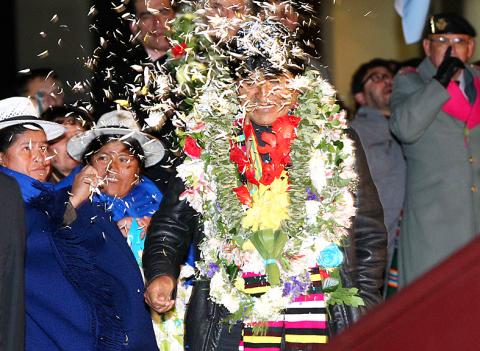Bolivian President Evo Morales urged European countries to “free themselves from the US empire” as he arrived home late on Wednesday after his plane was diverted because of suspicions that US intelligence leaker Edward Snowden was traveling with him.
Morales received a hero’s welcome from dozens of cheering supporters when his aircraft touched down near La Paz almost 17 hours after leaving Vienna, an Agence France-Presse reporter saw.
The jet, on its way home from Moscow, had been forced to land in the Austrian capital after several European nations denied it overfly rights, in an incident that sparked a diplomatic row and was likened by Morales to a “13-hour kidnapping.”

Photo: EPA
“Some countries of Europe have to free themselves from the US empire,” Morales told his supporters at the airport, who carried flowers, threw confetti and waved national flags.
“They are not going to frighten us, because we are a people with dignity and sovereignty,” he said.
Bolivian officials said France, Italy, Spain and Portugal initially denied his plane the right to fly through their air space late on Tuesday amid concerns that Snowden was aboard.
Late on Wednesday, a group of about 100 protesters threw rocks and firecrackers at the French embassy in the Bolivian capital, smashing windows. They also burned French flags.
France has since apologized for temporarily refusing entry to Morales’ jet, with French President Francois Hollande saying there was “conflicting information” about the plane passengers.
Snowden is seeking to avoid US espionage charges after leaking embarrassing details of a vast US phone and Internet surveillance program that has alarmed Washington’s foreign allies. The 30-year-old is currently holed up at a Moscow airport looking for a country that will give him safe haven.
Bolivia is one of 21 countries Snowden has asked for asylum. Morales said earlier this week that his country would be willing to study the request.
Once the European countries lifted their objections, Morales flew home via Spain and Brazil, where it made refueling stops.
Latin American nations have expressed outrage over the plane diversion.
Argentine President Cristina Kirchner called the European countries’ behavior “colonialist.” Her Brazilian counterpart Dilma Rousseff said she was “indignant.”
A meeting of a South American grouping called UNASUR was to convene yesterday to analyze the way Morales was treated.

AGING: As of last month, people aged 65 or older accounted for 20.06 percent of the total population and the number of couples who got married fell by 18,685 from 2024 Taiwan has surpassed South Korea as the country least willing to have children, with an annual crude birthrate of 4.62 per 1,000 people, Ministry of the Interior data showed yesterday. The nation was previously ranked the second-lowest country in terms of total fertility rate, or the average number of children a woman has in her lifetime. However, South Korea’s fertility rate began to recover from 2023, with total fertility rate rising from 0.72 and estimated to reach 0.82 to 0.85 by last year, and the crude birthrate projected at 6.7 per 1,000 people. Japan’s crude birthrate was projected to fall below six,

US President Donald Trump in an interview with the New York Times published on Thursday said that “it’s up to” Chinese President Xi Jinping (習近平) what China does on Taiwan, but that he would be “very unhappy” with a change in the “status quo.” “He [Xi] considers it to be a part of China, and that’s up to him what he’s going to be doing, but I’ve expressed to him that I would be very unhappy if he did that, and I don’t think he’ll do that. I hope he doesn’t do that,” Trump said. Trump made the comments in the context

SELF-DEFENSE: Tokyo has accelerated its spending goal and its defense minister said the nation needs to discuss whether it should develop nuclear-powered submarines China is ramping up objections to what it sees as Japan’s desire to acquire nuclear weapons, despite Tokyo’s longstanding renunciation of such arms, deepening another fissure in the two neighbors’ increasingly tense ties. In what appears to be a concerted effort, China’s foreign and defense ministries issued statements on Thursday condemning alleged remilitarism efforts by Tokyo. The remarks came as two of the country’s top think tanks jointly issued a 29-page report framing actions by “right-wing forces” in Japan as posing a “serious threat” to world peace. While that report did not define “right-wing forces,” the Chinese Ministry of Foreign Affairs was

PREPAREDNESS: Given the difficulty of importing ammunition during wartime, the Ministry of National Defense said it would prioritize ‘coproduction’ partnerships A newly formed unit of the Marine Corps tasked with land-based security operations has recently replaced its aging, domestically produced rifles with more advanced, US-made M4A1 rifles, a source said yesterday. The unnamed source familiar with the matter said the First Security Battalion of the Marine Corps’ Air Defense and Base Guard Group has replaced its older T65K2 rifles, which have been in service since the late 1980s, with the newly received M4A1s. The source did not say exactly when the upgrade took place or how many M4A1s were issued to the battalion. The confirmation came after Chinese-language media reported